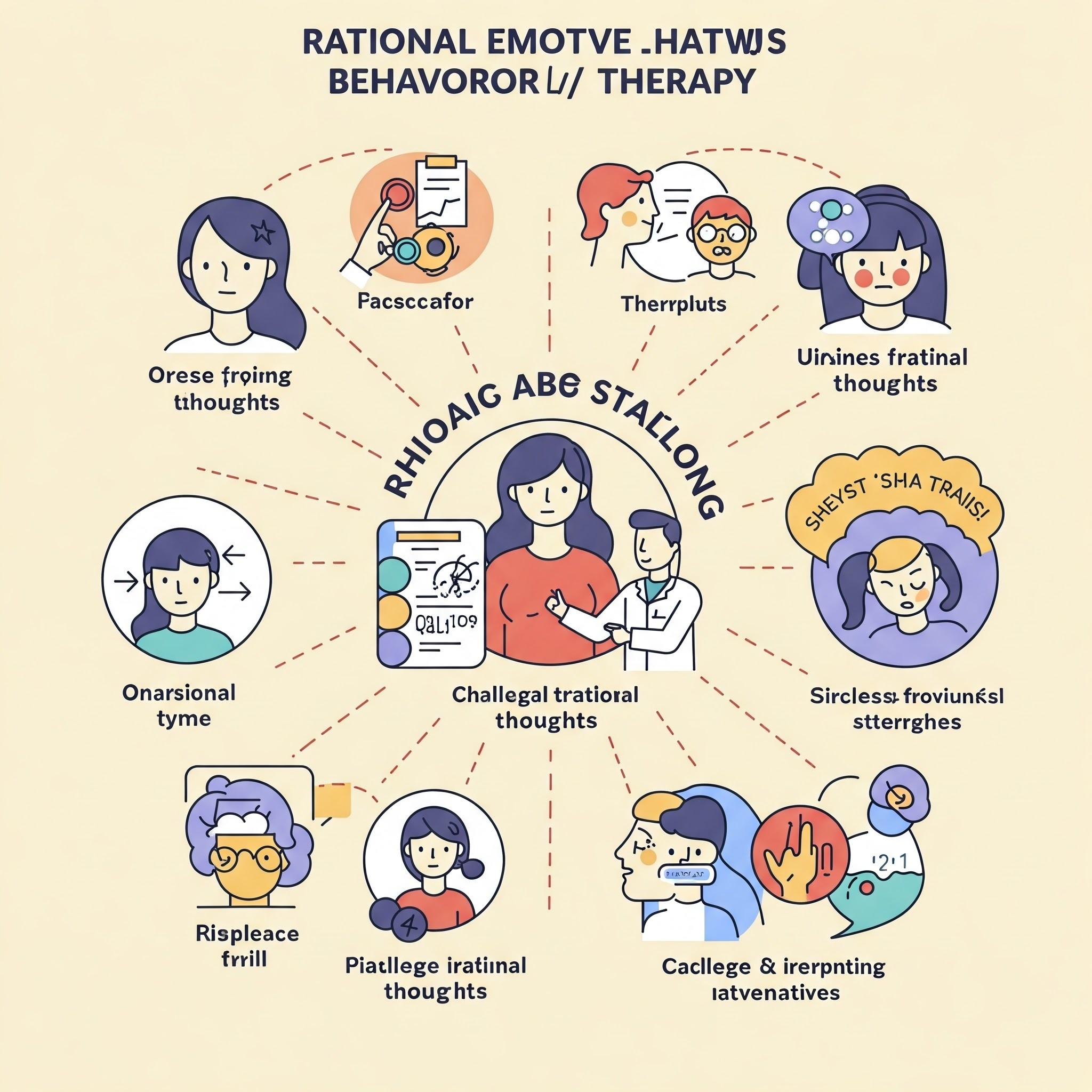REBT (Rational Emotive Behaviour Therapy)
Transformative rebt-behavioral therapy for emotional well-being
Empowering individuals to challenge negative thoughts and build healthier emotional patterns
At Neo-Woman Hospital, our REBT-Behavioral Therapy Clinic uses Rational Emotive Behavioral Therapy (REBT) to help individuals challenge and change irrational thought patterns that lead to emotional distress and unhealthy behaviors. REBT is a form of cognitive-behavioral therapy that focuses on identifying and altering negative beliefs and attitudes that affect a person’s mental health.
Our trained therapists work closely with clients to explore irrational thoughts, help them understand the connection between their thoughts, emotions, and behaviors, and provide practical tools for cognitive restructuring. Whether dealing with anxiety, depression, self-esteem issues, or life stressors, REBT helps individuals gain better emotional regulation and healthier coping mechanisms. Our goal is to empower patients to develop a more realistic and balanced perspective on life, fostering improved mental well-being. At our clinic, we offer a safe, supportive environment where clients can work towards transforming their thought patterns for lasting emotional growth and resilience.


Neo-woman's rebt-behavioral therapy clinic
Neo-Woman’s REBT-Behavioral Therapy Clinic offers a transformative approach to mental health by helping individuals identify and challenge irrational thought patterns that affect emotional well-being. Using Rational Emotive Behavior Therapy (REBT), our trained therapists work closely with clients to develop healthier ways of thinking and coping with stress, anxiety, depression, and other challenges.
Through evidence-based techniques, we empower clients to change negative thought patterns, regulate emotions, and improve their overall mental health. Our clinic offers a safe and supportive environment where you can work towards personal growth and lasting emotional resilience.
- Challenging irrational thoughts with rebt
Rational Emotive Behavioral Therapy (REBT), a type of cognitive behavior therapy (CBT), is an effective approach to identifying and challenging irrational beliefs that contribute to emotional distress. In REBT, individuals are taught to recognize and dispute negative thought patterns that are illogical or exaggerated, such as “I must always be perfect” or “Everyone must like me.”
By learning to question these irrational beliefs, individuals can reduce anxiety, depression, and other negative emotions. The therapy emphasizes that unrealistic expectations often lead to unnecessary suffering, and it encourages individuals to replace these thoughts with more rational, flexible alternatives. This process helps individuals feel more empowered and in control of their emotions, ultimately improving mental health by fostering healthier cognitive patterns.
Here are some of the check up and health screenings that you should get done:
- Pelvic Exam
- Pap Smear (Cervical Cancer Screening)
- Breast Exam
- Blood Pressure Measurement
- Cholesterol Screening
- Bone Density Scan (DXA)
- Blood Sugar Test (Glucose Screening)
- Thyroid Function Tests
- Blood Count (Complete Blood Count, CBC)
* The specific exams and screenings recommended can vary based on a woman’s age, family history, personal health history, and risk factors. It’s essential to discuss your individual healthcare needs and screening schedule with your healthcare provider.
- Cognitive restructuring for emotional regulation
Cognitive restructuring is a core technique in cognitive behavior therapy (CBT) that focuses on changing distorted thought patterns to regulate emotions more effectively.
Through this method, individuals learn to recognize automatic negative thoughts and replace them with more balanced, realistic perspectives. For example, if someone believes “I always fail at everything,” cognitive restructuring helps challenge that thought by examining evidence to the contrary and encouraging a more compassionate, self-accepting outlook.
By altering these maladaptive thought patterns, emotional regulation improves, leading to healthier responses to stress, anxiety, or depression. Cognitive restructuring empowers individuals to take control of their emotional responses, leading to better mental health and increased resilience when facing challenges in daily life.
- Managing anxiety with rebt
REBT is a powerful tool in managing anxiety, as it focuses on identifying and disputing irrational beliefs that fuel anxious feelings. Often, anxiety arises from thinking in extremes, such as “If something goes wrong, it will be catastrophic,” or “I cannot cope with uncertainty.”
REBT helps individuals challenge these unrealistic thoughts and replace them with more rational, balanced perspectives. By learning to reframe anxiety-provoking situations, individuals can reduce the intensity of their anxiety and develop healthier coping mechanisms. Additionally, REBT teaches individuals that anxiety is often rooted in perfectionism or a fear of rejection, and by accepting imperfection and uncertainty, they can achieve a greater sense of peace and emotional balance. Over time, the application of REBT can lead to a significant reduction in anxiety and an improved ability to manage stress.
- Building self-esteem and confidence through rebt
A key benefit of REBT is its ability to enhance self-esteem and confidence by challenging self-critical thoughts and beliefs. Many individuals with low self-esteem hold irrational beliefs such as “I am not good enough” or “I must always be liked by others.” REBT encourages individuals to examine the validity of these thoughts and replace them with more rational beliefs that promote self-acceptance.
By recognizing that mistakes and imperfections are a natural part of life, individuals can cultivate a sense of worth based on their inherent value, not external validation. Over time, this shift in perspective helps build confidence, allowing individuals to embrace their strengths and weaknesses without fear of judgment. This process of cognitive reframing enhances self-esteem and fosters a more positive self-image.
- Rebt techniques for overcoming depression
Rational Emotive Behavioral Therapy (REBT) is highly effective in addressing depression by helping individuals confront negative thought patterns that perpetuate low mood and hopelessness. Common irrational beliefs in depression include “I’m worthless” or “Nothing will ever get better.” REBT helps individuals dispute these unhelpful beliefs by questioning their validity and replacing them with more realistic, compassionate thoughts.
This process of cognitive reframing is central to overcoming depression, as it empowers individuals to change the way they view themselves and their circumstances. By recognizing that emotional pain is often exacerbated by distorted thinking, REBT offers practical tools to alter thought patterns, ultimately improving mood and helping individuals regain hope. Additionally, REBT encourages individuals to take actionable steps toward self- improvement, promoting feelings of agency and self-worth.

Frequently asked questions
What is REBT, and how does it help with mental health?
REBT (Rational Emotive Behavior Therapy) is a type of cognitive-behavioral therapy that focuses on identifying and changing irrational beliefs and negative thought patterns. It helps individuals confront self-defeating thoughts, reduce emotional distress, and develop healthier coping strategies.
How does REBT help with anxiety?
REBT helps individuals manage anxiety by challenging irrational thoughts and beliefs that contribute to anxious feelings. By changing these thought patterns, individuals can reframe their anxiety-provoking situations and develop healthier, more realistic perspectives that reduce anxiety.
Is REBT effective for depression?
Yes, REBT is effective for managing depression. It helps individuals identify negative beliefs, such as feelings of hopelessness or worthlessness, and replace them with more balanced and constructive thoughts. This process can improve mood and emotional regulation, leading to a reduction in depressive symptoms.
How long does it take to see results with REBT?
The duration of REBT varies for each individual. Some people may experience improvements after a few sessions, while others may require longer-term therapy. Regular practice of the skills learned in therapy can lead to lasting improvements in mental well-being.
Can REBT be done online?
Yes, REBT can be effectively practiced online. Online therapy provides the same benefits as in-person sessions, offering flexibility and convenience. With virtual sessions, individuals can work with certified therapists to challenge irrational beliefs, improve coping skills, and achieve better mental health.

Service line
Our locations
Neo-woman clinic
Apte Road
1212, Apte Rd, opp. Centro Hotel, Shirole Road, Shivajinagar, Pune, Maharashtra 411004
Contact us at: 9423039292
Our locations
Neo-woman clinic
Hadapsar
Gandharva Empire, 3rd floor, Above Fab India, Raskar Chowk, Amanora Park, Hadapsar, Pune, Maharashtra 411036
Contact us at: 7030114488
Copyright © 2026 neo-Woman – all rights reserved.
:::| powered by dimakh consultants |:::